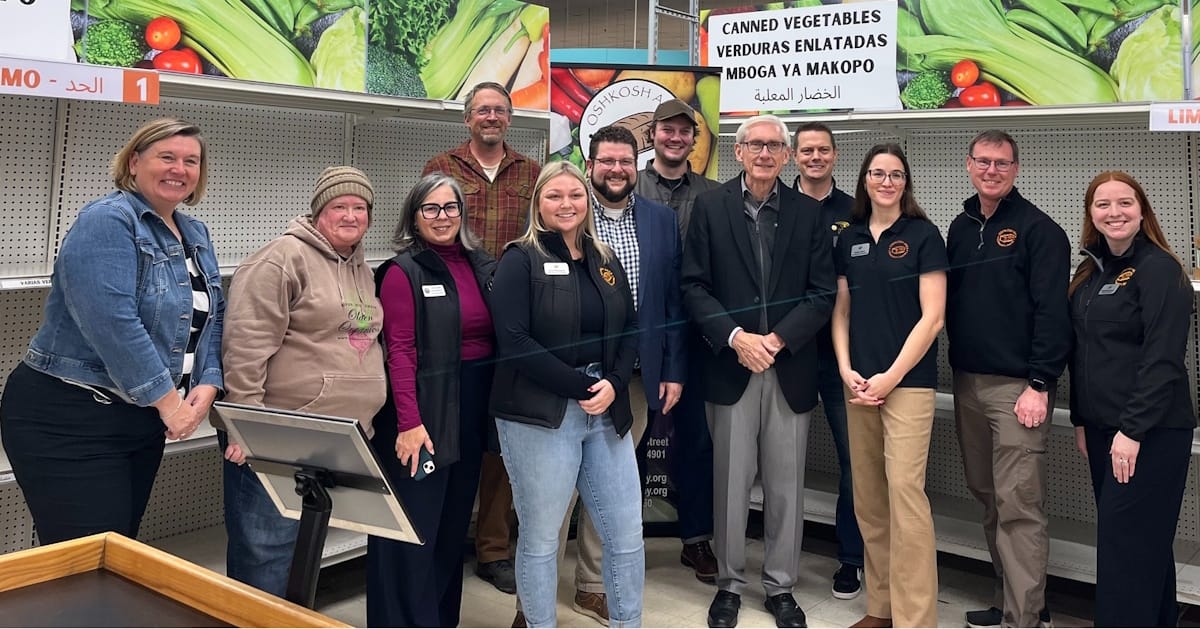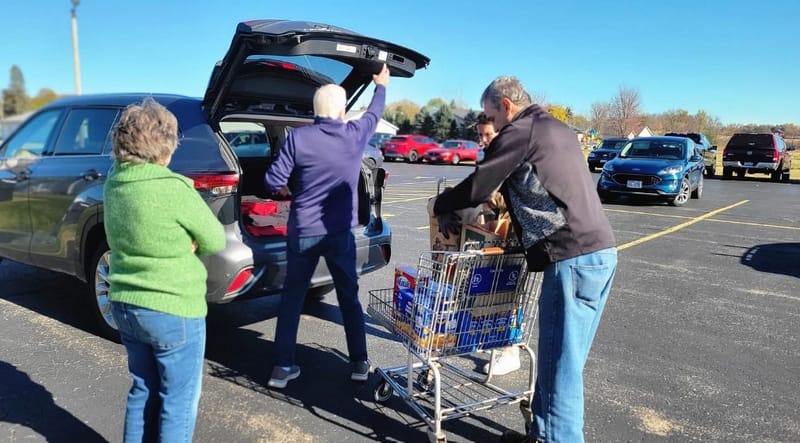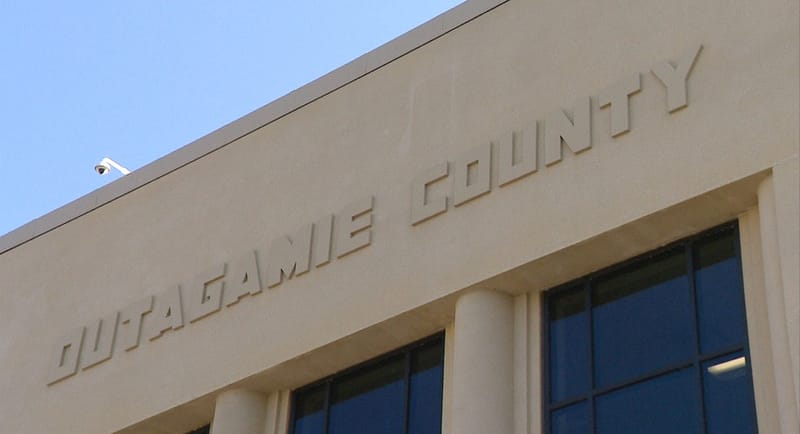During shutdown crisis, Oshkosh pantry finds way to cover people's needs
Though this crisis was averted, more potentially looms. Another government shutdown is possible as early as January, when President Trump might once again try to use SNAP benefits as leverage in negotiations. And with health premiums rising, people will be faced with choices.
Preparation, community largesse, some good fortune and a rapid response from the state of Wisconsin combined to keep the recent government shutdown and the attempts by the federal government to halt essential SNAP dispersals from becoming an outright crisis in Oshkosh.
So asserts Ryan Rasmussen, the Executive Director of the Oshkosh Area Community Pantry.
SNAP – known in Wisconsin as Food Shares – refers to the Supplemental Nutrition Assistance Program and is responsible for providing subsidies for families in need. In Wisconsin more than 700,000 people rely on SNAP benefits.
During past shutdowns, SNAP benefits were unaffected, given that contingency funding is available to cover such essential needs. This time, the Trump administration refused to release those funds.
With the shutdown looming and the potential federal cutback in The Emergency Food Assistance Program (TEFAP), through which the USDA provides food assistance to the states, the Oshkosh Area Community Pantry was bracing for potential shortages combined with greater demand.
“One of the things we ended up doing first was obviously working with our partners, making sure that we were bulking up orders,” Rasmussen said. “Food was most definitely flying off the shelf much faster than it had before. And we also decided to temporarily open for a couple additional shopping days that are non-traditional for us and extended our Saturday hours.”
Some good luck, some good governance
The good fortune began with the fact that state warehouses happened to have been fully supplied with TEFAP inventory when the crisis began, which helped to limit the shortages. Thus, Rasmussen’s concerns about TEFAP shortages were allayed … only to be replaced by President Trump’s refusal to release SNAP funding to the states.
But Gov. Tony Evers decided to release SNAP (or Food Share as it’s known in the state) funding within a week of Trump’s decision, meaning that people reliant on the assistance went only a week without benefits. (The federal government is expected to reimburse the state for its dispersals).
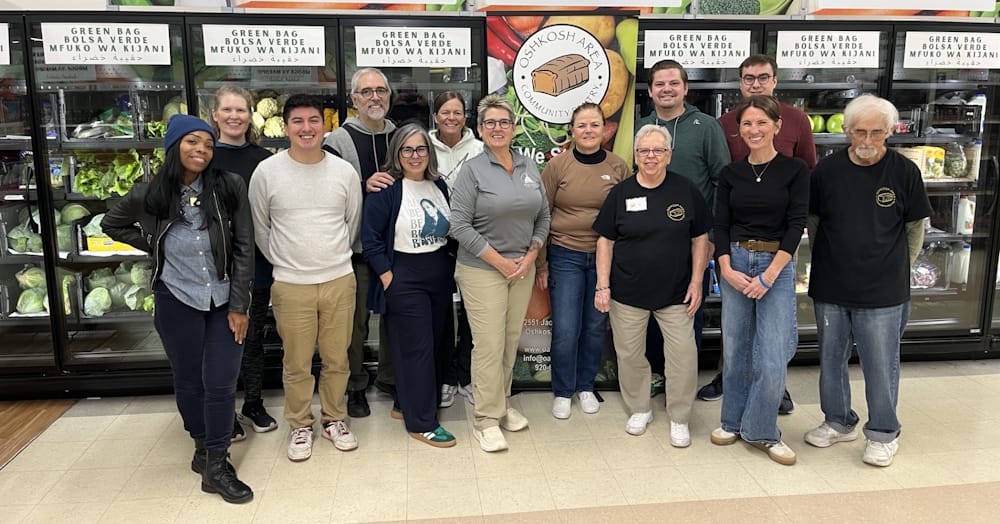
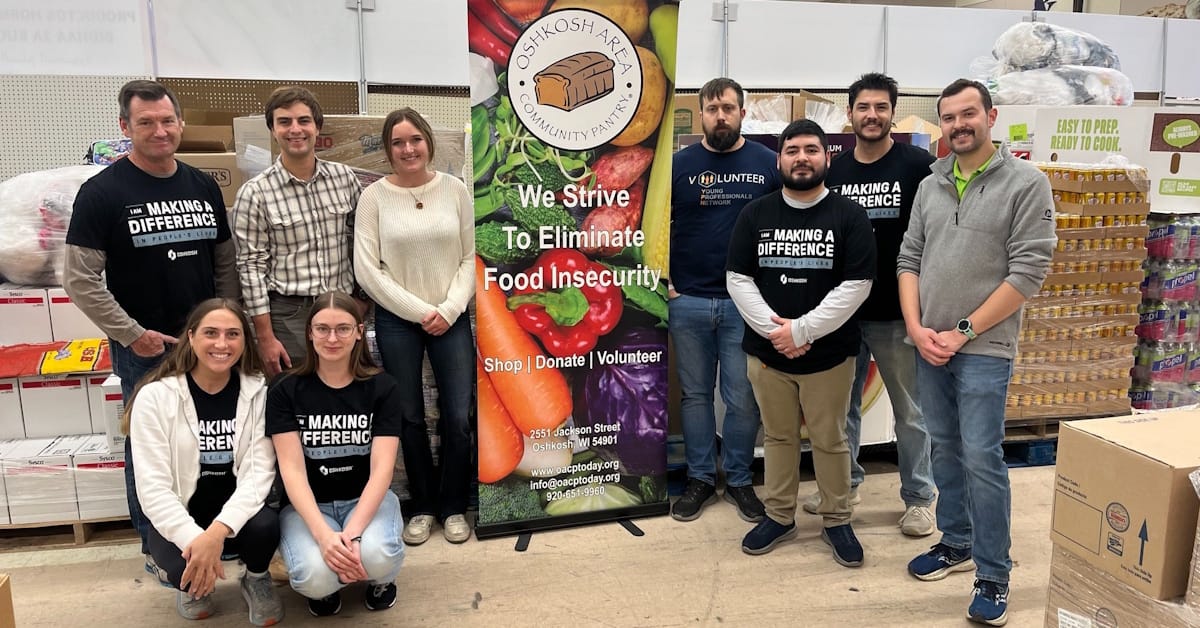
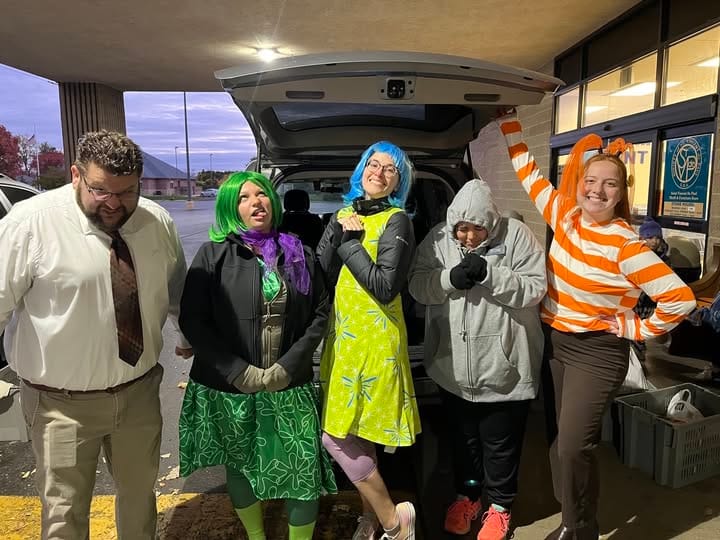
First two photos: Volunteers who helped stock shelves at the Oshkosh Area Community Pantry during the government shutdown. Far right: local Girl Scout troop drops off food donations.
“I admire the leadership of Gov. Evers to make sure Wisconsin had what it needed,” Rasmussen said. “It sounds like Wisconsin was really a leader in making sure that folks were going to get their benefits as soon as that initial appellate court decision (upholding temporarily Trump’s decision to withhold SNAP funding).
“Right now the drama continues as the Trump administration is trying to claw back that (SNAP) money. Gov. Evers has said multiple times that’s not happening here.”
Wisconsin was one of only a handful of states that rolled out those SNAP benefits after the federal halt to payments and the only state that dispersed those funds immediately.
Then came community generosity in the form of an outpouring of donations, both in cash and food, Rasmussen said. The University of Wisconsin-Oshkosh showed up with nine pallets of food after a food drive and it arrived at a moment when Rasmussen said scarcity was becoming a serious issue. For the first time in four years, the entire canned food section had run dry, he said.
Bipartisan outreach
Volunteers also poured in to stock shelves. One set of shelf-fillers was a group of legislators and activists from both parties. On hand were Democratic State Representative Lori Palmeri; Democratic State Senator Kristin Dassler-Alfheim and Republican State Representative Nate Gustafson as well as 2024 state assembly candidate and current chair of the Outagamie Democratic Party, Emily Tseffos.
“That really helps restore my faith,” Rasmussen said. “I mean, we had bipartisan support. They came together and they recognized that food insecurity does not need to be a bipartisan issue. They wanted to volunteer, give their time, stock shelves, make sure people had what they needed”
“And I don't want that story to die, because I think right now, in a world where we're so polarized, we had an example where both sides of the aisle finally came together, and they finally did something together.”
Tseffos agreed … to a point. She said she’d like to see such bipartisanship extend to upending the systems that make hunger an ongoing issue.
“I think it’s important to note we can all agree that people deserve to be fed,” she said. “Where I think the paths diverge is in treating the root causes vs. treating the symptom of a problem we need to address with legislation.
“And so I want to make sure we’re filling that immediate need, like we did at the pantry and like those programs have been doing. But we should be working to eliminate the need for food programs and food pantries. We need to connect what’s happening right now to the policy decisions that led us to the problem in the first place.”
Among many other groups offering donations or their time were local Girl Scouts; Oshkosh Corp.; Amcor Packaging; Kimberly Clark; nVent Electric; United Way; Oshkosh Area Women’s Association; and Community First Credit Union.
Ongoing need
The entire ordeal was traumatic for so many families in need, Rasmussen said. Call volume was off the charts as people began to panic as they heard the potentially dire ramifications of a shutdown and the withholding of benefits.
“It was a very confusing time,” he said. “People were asking, ‘What’s actually happening? Will I get paid? Will I not get paid? If I don’t get paid, can I use your pantry? What qualifications do I need? There was a lot of fear, a lot of worry.”
Rasmussen said one mom with several kids at home came in, obviously feeling the desperation of not knowing if her SNAP benefits would come in or when.
“She works but is struggling to make ends meet,” he said. “And her rent was due in November and she wasn’t sure what she was going to do for food until she came to us. But folks like her had absolutely no idea what was going to be happening because information was changing almost hourly. It created a lot of unnecessary concern.”
Though this crisis was averted, more potentially looms. Another government shutdown is possible as early as January, when President Trump might once again try to use SNAP benefits as leverage in negotiations. And with the likely end of the enhanced health insurance subsidies that Democrats fought to extend in the recent budget fight, premiums are certain to rise – even double for some people, according to the Kaiser Family Foundation – and working class families will once again be faced with choices.
Then, too, is the waning economy, rising prices and stagnating employment. Oshkosh Corporation just laid off 150 workers, for instance.
Rasmussen sees all this, like Tseffos, as part of a system that keeps people from thriving.
“I think these are all the things why food insecurity, to me, is always something that is in the middle,” he said. “It's never going to be that thing that I think you can systemically change without actually dumping the money to do it. There are always these factors all the way around that are affecting these people – rent, medical bills, insurance, low wages. There's all these other things in play and it's almost like this domino effect where, in total, the system is against you.
“No matter what you do, there's always going to be a lever that is going to try to beat you down. And I think we're seeing that now right as the ACA credits start to go away, and they're going to see their premiums go sky high, this is just going to be another one of those levers that is going to help raise the level of food insecurity and need that's going to be there.”
During shutdown crisis, Oshkosh pantry finds way to cover people's needs © 2025 by Kelly Fenton is licensed under CC BY-NC-ND 4.0


